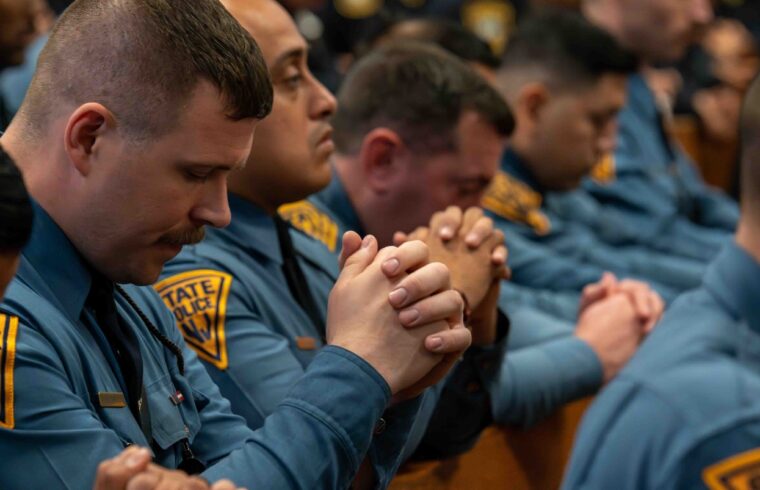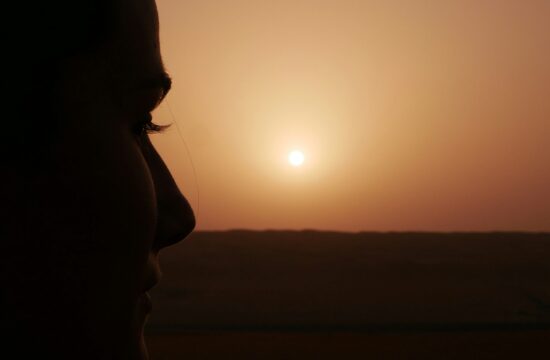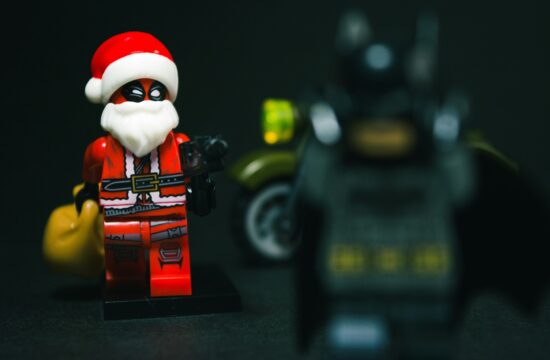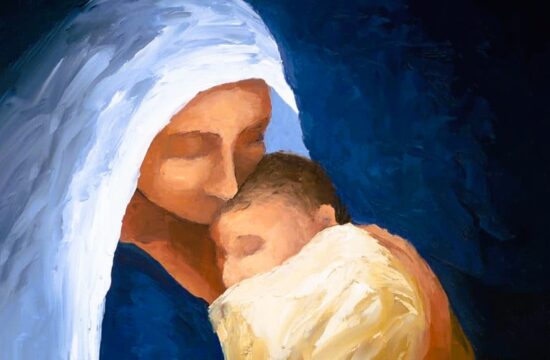A few years ago, a story popped up that caught a lot of people off guard—not because of some celebrity scandal or political drama, but because it seemed so simple at first: a police officer offering to pray with people in need.
After devastating floods hit Louisiana, Officer Clay Higgins stopped by a local Red Cross shelter. He wasn’t there to make arrests or give orders. He just wanted to check on those who’d lost nearly everything, and when he saw their pain, he offered what comfort he could—he quietly asked if anyone wanted to pray with him.
Thank you for taking the time to read this homily for the feast of the 29th SUNDAY IN ORDINARY TIME (October 19, 2025). Your support means a great deal to me, and I’m deeply grateful for the many who share these messages with their friends, families and social media followers. If you’ve found meaning in these words, I’d be grateful if you’d share them with others who might benefit.
And for those who prefer listening, you can find the audio version on SoundCloud HERE or subscribe to the podcast on iTunes HERE. Your comments, messages, and the way you’ve embraced these homilies continue to inspire me. Sincerely in Christ -Father Ji
But what happened next surprised him—and a lot of others. A Red Cross worker told Officer Higgins that prayer wasn’t allowed in their shelters. When he asked for clarification, a supervisor explained that the Red Cross, as a secular organization, couldn’t permit spiritual counseling or religious interaction with residents. The logic was simple, but the irony was obvious—an organization called the Red Cross saying there’s no place for religion. Maybe they should change the name to the Red Smiley Face or something, just to be clear.
Word got out, and soon this local incident became an international story. There were op-eds, statements from the Red Cross, and other pastors sharing similar experiences. What started as a simple act of compassion quickly turned into a public debate about freedom of speech, freedom of religion, and the place of prayer in the public square. Officer Higgins summed it up plainly: “I was not proselytizing. I was just there to thank volunteers and offer prayers and encouragement… Christian compassion was not welcomed there in the manner I had provided.”
Why did that simple act stir up so much controversy? Why does prayer, of all things, make people so uncomfortable? I think it’s because prayer—real prayer—forces us to face what we believe, and what we’re willing to do about it. In our culture, we’ve gotten used to treating prayer as something best kept behind closed doors, or at most, a polite phrase we toss out when someone’s hurting: “You’re in my prayers.” It’s easy, it’s safe, and it doesn’t require much from us. But when prayer actually moves out into the open—when it becomes an act of real faith and real vulnerability—suddenly it’s seen as dangerous, even threatening.
And that’s exactly where today’s scriptures meet us.
Look at that first reading. It’s honestly one of the most dramatic moments in all of scripture, but you have to know the backstory. Moses has just led God’s people—the Israelites—out of Egypt, out of slavery. Remember, Moses went to Pharaoh again and again, saying, “The Lord God wants His people to be free to worship Him.” But Pharaoh refused. He wouldn’t listen to God, wouldn’t listen to Moses, and hardened his heart. Egypt was a culture that worshipped the things of creation—frogs, rivers, the sun, even Pharaoh himself was treated as a god. So God responded in a way they couldn’t ignore: the plagues. Water turned to blood. Frogs covered the land. There were ten in all. Each plague wasn’t just a punishment—it was God showing the Egyptians that their so-called gods were powerless, and that Israel belonged to the true God.
You know how the story goes: Pharaoh finally lets them go, but then changes his mind and chases after them. God parts the Red Sea, the Israelites cross on dry land, and when the Egyptians pursue, the waters come crashing down. The Israelites are finally free.
But freedom isn’t the end of the story. A few weeks later, as they’re journeying through the wilderness, they’re attacked by the Amalekites—a brutal tribe who made a habit of picking off the weakest, the sick, the elderly, the children. This was evil preying on the vulnerable. And this time, God doesn’t just unleash another plague. Moses tells the people to fight—but he doesn’t stand back and watch. He climbs a hill, raises his staff, and prays. As long as Moses keeps his hands lifted in prayer, Israel prevails. When he tires and his arms droop, the enemy gains ground. So Aaron and Hur, his companions, hold up his arms until the battle is won.
Why didn’t God just wipe out the Amalekites instantly? He’d done it before. But now, God wanted His people to fight as free men and women, not as slaves. He wanted them to know their true identity—not just as survivors, but as His chosen people, called to trust, to pray, and to act. God’s people are never meant to be passive. Faith and action go hand in hand. Moses’ prayer wasn’t just for show; it was the lifeline for the whole community.
Prayer is threatening to the powers of the world—just ask the Amalekites. When God’s people pray with faith, it’s not just words in the air. It’s how God’s will breaks in, how the weak are defended, how the community is held together.
That brings us to the Gospel. For weeks now, we’ve been hearing Jesus tell parables as He journeys to Jerusalem. He’s preparing for His own passion—His arrest, His trial, His crucifixion. He knows what’s coming for Him, and for His followers. And so He tells this story: a widow—about as powerless and invisible as you could get in that society—goes to a corrupt judge, day after day. She isn’t asking for special treatment, just for justice, for someone to set right a wrong done to her. She refuses to give up. She refuses to be silenced. The judge finally gives in—not out of compassion, but because he just wants her to go away.
Jesus isn’t saying God is like that judge—hard-hearted, indifferent, annoyed by our prayers. He’s saying, if even a corrupt judge will act because of persistence, how much more will your loving Father listen to you? How much more will He act—not because you wear Him down, but because He loves you, because He wants you to come to Him, again and again, with every hope and every sorrow.
And here’s the real challenge: the world isn’t comfortable with this. The world was threatened by Jesus—by His mercy, His miracles, His willingness to stand with the outcast and the broken. The Romans, the religious leaders, everyone with something to lose saw Him as a threat. That’s why He ends up on the Cross. And after the resurrection, when He pours out His Holy Spirit, when He gives us the power to pray, to love, to forgive, to change the world—you better believe that’s still threatening.
So what do we do with all this? Some days we might feel like Moses, arms raised, faith strong. Other days, we’re tired, and need someone else to help us keep going. Sometimes, we’re that widow, coming back again and again, even when the world tells us to be quiet. But wherever we are, today’s scriptures are clear: don’t stop praying. Don’t hide your faith. Don’t give up—even when you’re tired, even when it’s inconvenient, even when it feels like no one’s listening. Because God is listening. And He’s not annoyed by your prayers. He’s waiting to meet you, again and again, through every struggle and every joy.
So let’s be persistent. Let’s be bold. Let’s let our prayer move out into the world—yes, even if it makes people uncomfortable. Because prayer isn’t just something we do; it’s who we are. It’s how God changes hearts, and how He changes us.
And maybe, just maybe, when the Son of Man comes, He’ll find faith burning bright in us—a faith that prays, persists, and trusts, no matter what.
But ask yourself this: If someone followed you around for a week, would they know you were a person of prayer? Would your faith be visible, even when it’s inconvenient, even when it costs you? Or would it be hidden—safe, polite, and forgettable?
Maybe the world is uncomfortable with prayer because deep down, it knows what prayer can do. It can move mountains. It can break chains. It can turn ordinary people into saints. It can topple the Pharaohs and Amalekites of our own day—the powers of hate, violence, despair.
This week, don’t settle for silent, private, forgettable faith. Let your prayer spill out into your words, your choices, your courage. Be the one who keeps coming back, who holds up the arms of others, who refuses to stop believing that God is listening and God will act.
Because the world desperately needs people who won’t give up on prayer—who won’t give up on hope. The world needs you.
And if you ever wonder whether one person’s quiet, persistent faith can make a difference—remember Officer Higgins, quietly offering prayer in a shelter when the world said, “Not here.” He didn’t force anything. He didn’t shout. He simply showed up, unashamed of his faith, willing to risk a little discomfort for the sake of love.
So let’s pray as if God is listening—because He is. Let’s act as if the world can change—because it can. And let’s live so that when Christ returns, He’ll find in us the kind of stubborn, joyful, relentless faith that refuses to be silenced.
That’s the faith that moves hearts. That’s the faith that changes history. And that’s the faith the world is dying to see.












I often don’t understand my priest because he is from a foreign country. I appreciate the ability to sign into your homily because it is always clear and I can see how it relates to me. Thank you.